Submitted:
04 July 2023
Posted:
06 July 2023
You are already at the latest version
Abstract

Keywords:
1. Introduction
2. Evaluation of Catalyst Performances
2.1. FE
2.2. Overpotential and applied potential
2.3. Current density and TOF
| MOF | Organic linkers | MOF-derived materials | cell | electrolyte | Potential (V vs. RHE) |
FEHCOOH (%) |
Current density (mA/cm-1) |
Stability (h) |
refs |
|---|---|---|---|---|---|---|---|---|---|
| 1. MOFs materials | |||||||||
| CR-MOF (Cu) | BDC | - | H-cell | 0.5 M KHCO3 | -1.2/-1.4/-1.6 vs. SHE | ~>29.4 | - | - | [18] |
| Cu-MOF | BTC | - | H-cell | 0.1 M KHCO3 | -0.1 vs. SCE | 21 | - | - | [27] |
| 0.1 M TBAB/DMF | -0.6 vs. SCE | 58 | - | - | |||||
| Cu2(CuTCPP) | CuTCPP | CuO, Cu2O and Cu4O3 | H-cell | 1M H2O and 0.5 M EMIMBF4/CH3CN | -1.55 vs. Ag/Ag+ | 68.4 | - | - | [21] |
| PCN-222(Cu) (Zr) | CuTCPP | - | H-cell | 0.5 M KHCO3 | -0.7 | 44.3 | 3.2 | 10 | [28] |
| PCN-224(Cu) (Zr) | CuTCPP | - | 34.1 | 2.4 | 10 | ||||
| Bi-BTB | BTB | Bi2O2CO3 | H-cell | 0.5 M KHCO3 | -0.669 | 96.1 | 13.2 | 48 | [29] |
| -0.969 | 80 | 60.5 | - | ||||||
| Bi-MOF | BTC | Bi and Bi2O2.5 | flow cell | 1 M KOH | -0.64 | 92 | 150 | - | [30] |
| H-cell | 0.1 M KHCO3 | -1.1 | 80 | 10 | 30 | ||||
| CAU-17 (Bi) | BTC | - | H-cell | 0.1 M KHCO3 | ~-0.9 | 92.2 | - | 30 | [10] |
| Bi-FDCA | FDCA | Bi2O2CO3 | H-cell | 0.1 M KHCO3 | -1.2 | 95.1 | 19.6 | - | [31] |
| BiBTB | BTB | Bi2O2CO3 | H-cell | 0.5 M KHCO3 | -0.97 | 95 | 5.4 | - | [32] |
| SU-100 (Bi) | BPT | 90 | 8.0 | - | |||||
| dense BiBTC | BTC | 80 | 4.8 | - | |||||
| CAU-17 (Bi) | BTC | - | - | - | |||||
| SU-101 (Bi) | ellagic acid | - | - | - | - | ||||
| BSG (Bi) | gallic acid | Bi2O2CO3 | 85 | 7.6 | - | ||||
| In-BDC | BDC | - | H-cell | 0.5 M KHCO3 | -0.669 | 88 | 7.4 | 21 | [33] |
| 0.6SZ (ZIF-8 with Sn doping) |
MeIm | - | H-cell | 0.5 M KHCO3 | -1.1 | 74 | 27 | 7 | [17] |
| Sn-N6-MOF | MeIm and 1H-1,2,3-triazole | Sn nanoclusters | H-cell | 0.5 M KHCO3 | -1.23 | 85 | 23 | 6 | [34] |
| MIL-53 (Al) | BDC | - | flow cell | 0.05 M K2CO3 | -0.9 ~ -1.1 | 14 ~ 19 | - | - | [35] |
| 2. Metal Nanomaterials (Electrochemical Reduction) | |||||||||
| Cu-SIM NU-1000 (Zn) | TBAPy | Cu NPs | H-cell | 0.1 M NaClO4 | -0.82 | 28 | 1.2 | - | [36] |
| H-Cu | BTC | HE-Cu | H-cell | 0.1 M KHCO3 | -1.03 | 40.1 | - | - | [37] |
| CAU-17 (Bi) | BTC | Bi NSs | H-cell | 0.1 M KHCO3 | -1.1 | 92 | ~10.8 | 10 | [38] |
| CAU-17 (Bi) | BTC | Bi NSs | flow cell | 1 M KOH | -0.48 | 97.4 | 133 | >10 (>200 mA cm-2) | [39] |
| CAU-17 (Bi) | BTC | Bi/CC-17 NSs | H-cell | 0.5 M KHCO3 | -1.1 | 98 | 45 | 48 | [40] |
| Bi-MOF | BDC | BiMNS | H-cell | 0.5 M KHCO3 | -0.8 | 98 | 23.5 | 40 | [41] |
| BiMOLs | IDC | Bi-ene | H-cell | 0.5 M KHCO3 | -0.83 ~ -1.18 | ~100 | 72.0 (-1.18 V) | 12 (-0.9 V) | [42] |
| flow cell | 1M KOH | -0.57/-0.75 | 99.8/99.2 | 100/200 | - | ||||
| BiBTB | BTB | Bi NPs | H-cell | 0.5 M KHCO3 | -0.97 | 95 | 5.4 | 32 | [43] |
| Pb-MOF | CA | Pb3(CO3)2(OH)2 (ER-HC) | H-cell | 0.1 M KHCO3 | -0.88 | 96.8 | 2.0 | - | [44] |
| 3. Carbon-based Nanocomposites (Carbonization) | |||||||||
| Cu-BTC | BTC | Cu2O/Cu@NC-800 | H-cell | 0.1 M KHCO3 | -0.68 | 70.5 | - | 30 | [23] |
| Cu-BTT | BTT | Cu–N–C1100 | H-cell | 0.1 M KHCO3 | -0.9 | 38.1 | 3.7 | - | [45] |
| BiBTC | BTC | Bi2O3@C | H-cell | 0.5 M KHCO3 | -0.9 | 92 | 8.0 | 10 | [25] |
| flow cell | 1 M KOH | -0.3 ~ -1.4 | >93% | 1.4-208 | 1 | ||||
| SU101 (Bi) | ellagic acid | SOR Bi@C NPs | H-cell | 0.5 M KHCO3 | -0.99 | 95 | 11.1 | 18 (-1.0 V) | [46] |
| flow cell | 1 M KOH | -1.12 | 90 | 100 | - | ||||
| MIL-68 (In) | BDC | In2O3-x@C MIL-68-N2 |
flow cell | 1 M KOH | -0.4/-1 | 84/97 | 13.1/221.65 | 120 (-1.0 V) | [47] |
| V11 (In) | BCP | CPs@V11 | H-cell | 0.5 M KHCO3 | -0.84 | 90.1 | 7.62 | 20 | [48] |
| ZIF-8 (Zn) | MeIm | InSAs/NC | H-cell | 0.5 M KHCO3 | -0.65 | 96 | 8.9 | - | [49] |
| ZIF-8 (Zn) | MeIm | In−N−C | H-cell | 0.5 M KHCO3 | -0.79 | 80 | 8.5 | 20 | [50] |
| 5. Bimetallic Nanocomposites | |||||||||
| Cu, Bi bi-MOF | BTC | Cu1-Bi/Bi2O3@C (Carbonization) |
H-cell | 0.5 M KHCO3 | -0.94 | 93 | ~11.5 | 10 | [16] |
| CuBi-MOF | BTC | CuBi75 (Carbonization) |
H-cell | 0.5 M KHCO3 | -0.77 | 100 | - | 24 | [51] |
| In-Bi-MOF | BTC | BiIn alloy NPs (Electrochemical Reduction) |
H-cell | 0.1 M KHCO3 | -1.1 | 97.6 | - | 30 | [52] |
| flow cell | 1M KOH | -0.92 | 97.8 | 250 | - | ||||
| MEA | 0.1 M KHCO3 | - | - | - | 25 (120 mA cm-2) | ||||
| Bi-In-MOF | BTC | BiIn5-500@C (Carbonization) |
H-cell | 0.5 M KHCO3 | -0.86 | 97.5 | 13.5 | 15 | [53] |
| MOF-808 (Zr) | BTC | M-AuPd(20) (Chemical Reduction) |
H-cell | 0.1 M KHCO3 | -0.25 | >99 | ~7 | - | [12] |
3. MOFs Materials
3.1. Copper-Based MOFs
3.2. Bismuth-based MOFs
3.3. Indium-Based MOFs
3.4. Tin-Based MOFs
3.5. Aluminum-Based MOFs
4. MOFs-Derived Metal Nanomaterials
4.1. Copper-Based Nanomaterials
4.2. Bismuth-Based Nanomaterials
4.3. Lead-Based Nanomaterials
5. MOFs-Derived Carbon-Based Nanocomposites
5.1. Copper-Based Nanocomposites
5.2. Bismuth-Based Nanocomposites
5.3. Indium-Based Nanocomposites
6. Bimetallic MOFs-derived Nanocomposites
6.1. Copper and Bismuth-based Bimetallic Nanocomposites
6.2. Bismuth and Indium-based Bimetallic Nanocomposites
6.3. Palladium and Gold-based Bimetallic Nanocomposites
7. Summary and Outlook
Acknowledgments
Conflicts of Interest
References
- Abdelkader-Fernández, V. K.; Fernandes, D. M.; Freire, C. , Carbon-based electrocatalysts for CO2 electroreduction produced via MOF, biomass, and other precursors carbonization: A review. J. CO2 Util. 2020, 42, 101350. [Google Scholar] [CrossRef]
- Yang, Z. W.; Chen, J. M.; Qiu, L. Q.; Xie, W. J.; He, L. N. , Molecular Engineering of Metal Complexes for Electrocatalytic Carbon Dioxide Reduction: From Adjustment of Intrinsic Activity to Molecular Immobilization. Angew. Chem. Int. Ed. 2022, 61, e202205301. [Google Scholar] [CrossRef] [PubMed]
- Mahmood, A.; Guo, W.; Tabassum, H.; Zou, R. , Metal-Organic Framework-Based Nanomaterials for Electrocatalysis. Adv. Energy Mater. 2016, 6, 1600423. [Google Scholar] [CrossRef]
- Zhang, W.; Hu, Y.; Ma, L.; Zhu, G.; Wang, Y.; Xue, X.; Chen, R.; Yang, S.; Jin, Z. , Progress and Perspective of Electrocatalytic CO2 Reduction for Renewable Carbonaceous Fuels and Chemicals. Adv. Sci. 2018, 5, 1700275. [Google Scholar] [CrossRef]
- Raciti, D.; Wang, C. , Recent Advances in CO2 Reduction Electrocatalysis on Copper. ACS Energy Lett. 2018, 3, 1545–1556. [Google Scholar] [CrossRef]
- Wang, Y.; Su, H.; He, Y.; Li, L.; Zhu, S.; Shen, H.; Xie, P.; Fu, X.; Zhou, G.; Feng, C.; Zhao, D.; Xiao, F.; Zhu, X.; Zeng, Y.; Shao, M.; Chen, S.; Wu, G.; Zeng, J.; Wang, C. , Advanced Electrocatalysts with Single-Metal-Atom Active Sites. Chem. Rev. 2020, 120, 12217–12314. [Google Scholar] [CrossRef] [PubMed]
- Masood ul Hasan, I.; Peng, L.; Mao, J.; He, R.; Wang, Y.; Fu, J.; Xu, N.; Qiao, J. , Carbon-based metal-free catalysts for electrochemical CO2 reduction: Activity, selectivity, and stability. Carbon Energy 2020, 3, 24–49. [Google Scholar] [CrossRef]
- Fellay, C.; Yan, N.; Dyson, P. J.; Laurenczy, G. , Selective formic acid decomposition for high-pressure hydrogen generation: a mechanistic study. Chem. Eur. J. 2009, 15, 3752–3760. [Google Scholar] [CrossRef]
- Duarah, P.; Haldar, D.; Yadav, V. S. K.; Purkait, M. K. , Progress in the electrochemical reduction of CO2 to formic acid: A review on current trends and future prospects. J. Environ. Chem. Eng. 2021, 9, 106394. [Google Scholar] [CrossRef]
- Li, F.; Gu, G. H.; Choi, C.; Kolla, P.; Hong, S.; Wu, T.-S.; Soo, Y.-L.; Masa, J.; Mukerjee, S.; Jung, Y.; Qiu, J.; Sun, Z. Highly stable two-dimensional bismuth metal-organic frameworks for efficient electrochemical reduction of CO2. Appl. Catal., B 2020, 277, 119241. [Google Scholar] [CrossRef]
- Zhang, R.-Z.; Wu, B.-Y.; Li, Q.; Lu, L.-L.; Shi, W.; Cheng, P. , Design strategies and mechanism studies of CO2 electroreduction catalysts based on coordination chemistry. Coord. Chem. Rev. 2020, 422, 213436. [Google Scholar] [CrossRef]
- Bok, J.; Lee, S. Y.; Lee, B. H.; Kim, C.; Nguyen, D. L. T.; Kim, J. W.; Jung, E.; Lee, C. W.; Jung, Y.; Lee, H. S.; Kim, J.; Lee, K.; Ko, W.; Kim, Y. S.; Cho, S. P.; Yoo, J. S.; Hyeon, T.; Hwang, Y. J. , Designing Atomically Dispersed Au on Tensile-Strained Pd for Efficient CO2 Electroreduction to Formate. J. Am. Chem. Soc. 2021, 143, 5386–5395. [Google Scholar] [CrossRef]
- Kortlever, R.; Shen, J.; Schouten, K. J.; Calle-Vallejo, F.; Koper, M. T. , Catalysts and Reaction Pathways for the Electrochemical Reduction of Carbon Dioxide. J. Phys. Chem. Lett. 2015, 6, 4073–4082. [Google Scholar] [CrossRef] [PubMed]
- Li, X.; Yang, X.; Xue, H.; Pang, H.; Xu, Q. , Metal-organic frameworks as a platform for clean energy applications. EnergyChem 2020, 2, 100027. [Google Scholar] [CrossRef]
- Chughtai, A. H.; Ahmad, N.; Younus, H. A.; Laypkov, A.; Verpoort, F. , Metal-organic frameworks: versatile heterogeneous catalysts for efficient catalytic organic transformations. Chem. Soc. Rev. 2015, 44, 6804–6849. [Google Scholar] [CrossRef]
- Xue, Y.; Li, C.; Zhou, X.; Kuang, Z.; Zhao, W.; Zhang, Q.; Chen, H. , MOF-Derived Cu/Bi Bi-metallic Catalyst to Enhance Selectivity Toward Formate for CO2 Electroreduction. ChemElectroChem 2022, 9, e202101648. [Google Scholar] [CrossRef]
- Geng, W.; Chen, W.; Li, G.; Dong, X.; Song, Y.; Wei, W.; Sun, Y. , Induced CO2 Electroreduction to Formic Acid on Metal-Organic Frameworks via Node Doping. ChemSusChem 2020, 13, 4035–4040. [Google Scholar] [CrossRef]
- Hinogami, R.; Yotsuhashi, S.; Deguchi, M.; Zenitani, Y.; Hashiba, H.; Yamada, Y. , Electrochemical Reduction of Carbon Dioxide Using a Copper Rubeanate Metal Organic Framework. ECS Electrochem. Lett. 2012, 1, H17–H19. [Google Scholar] [CrossRef]
- Wang, R.; Liu, J.; Huang, Q.; Dong, L. Z.; Li, S. L.; Lan, Y. Q. , Partial Coordination-Perturbed Bi-Copper Sites for Selective Electroreduction of CO2 to Hydrocarbons. Angew. Chem. Int. Ed. 2021, 60, 19829–19835. [Google Scholar] [CrossRef]
- Zhuo, L. L.; Chen, P.; Zheng, K.; Zhang, X. W.; Wu, J. X.; Lin, D. Y.; Liu, S. Y.; Wang, Z. S.; Liu, J. Y.; Zhou, D. D.; Zhang, J. P. , Flexible Cuprous Triazolate Frameworks as Highly Stable and Efficient Electrocatalysts for CO2 Reduction with Tunable C2H4/CH4 Selectivity. Angew. Chem. Int. Ed. 2022, 61, e202204967. [Google Scholar] [CrossRef]
- Wu, J. X.; Hou, S. Z.; Zhang, X. D.; Xu, M.; Yang, H. F.; Cao, P. S.; Gu, Z. Y. , Cathodized copper porphyrin metal-organic framework nanosheets for selective formate and acetate production from CO2 electroreduction. Chem. Sci. 2019, 10, 2199–2205. [Google Scholar] [CrossRef]
- Zheng, W.; Lee, L. Y. S. , Metal-Organic Frameworks for Electrocatalysis: Catalyst or Precatalyst? ACS Energy Lett. 2021, 6, 2838–2843. [Google Scholar] [CrossRef]
- Li, D.; Liu, T.; Yan, Z.; Zhen, L.; Liu, J.; Wu, J.; Feng, Y. , MOF-Derived Cu2O/Cu Nanospheres Anchored in Nitrogen-Doped Hollow Porous Carbon Framework for Increasing the Selectivity and Activity of Electrochemical CO2-to-Formate Conversion. ACS Appl. Mater. Interfaces 2020, 12, 7030–7037. [Google Scholar] [CrossRef]
- Guan, B. Y.; Yu, X. Y.; Wu, H. B.; Lou, X. W. D. , Complex Nanostructures from Materials based on Metal-Organic Frameworks for Electrochemical Energy Storage and Conversion. Adv. Mater. 2017, 29, 1703614. [Google Scholar] [CrossRef] [PubMed]
- Deng, P.; Yang, F.; Wang, Z.; Chen, S.; Zhou, Y.; Zaman, S.; Xia, B. Y. , Metal-Organic Framework-Derived Carbon Nanorods Encapsulating Bismuth Oxides for Rapid and Selective CO2 Electroreduction to Formate. Angew. Chem. Int. Ed. 2020, 59, 10807–10813. [Google Scholar] [CrossRef] [PubMed]
- Wang, J.; Zhang, Y.; Ma, Y.; Yin, J.; Wang, Y.; Fan, Z. , Electrocatalytic Reduction of Carbon Dioxide to High-Value Multicarbon Products with Metal-Organic Frameworks and Their Derived Materials. ACS Mater. Lett. 2022, 4, 2058–2079. [Google Scholar] [CrossRef]
- Hwang, S. M.; Choi, S. Y.; Youn, M. H.; Lee, W.; Park, K. T.; Gothandapani, K.; Grace, A. N.; Jeong, S. K. , Investigation on Electroreduction of CO2 to Formic Acid Using Cu3(BTC)2 Metal-Organic Framework (Cu-MOF) and Graphene Oxide. ACS Omega 2020, 5, 23919–23930. [Google Scholar] [CrossRef]
- Liu, M. J.; Cao, S. M.; Feng, B. Q.; Dong, B. X.; Ding, Y. X.; Zheng, Q. H.; Teng, Y. L.; Li, Z. W.; Liu, W. L.; Feng, L. G. , Revealing the structure-activity relationship of two Cu-porphyrin-based metal-organic frameworks for the electrochemical CO2-to-HCOOH transformation. Dalton Trans. 2020, 49, 14995–15001. [Google Scholar] [CrossRef]
- Yuan, W.-W.; Wu, J.-X.; Zhang, X.-D.; Hou, S.-Z.; Xu, M.; Gu, Z.-Y. , In situ transformation of bismuth metal-organic frameworks for efficient selective electroreduction of CO2 to formate. J. Mater. Chem. A 2020, 8, 24486–24492. [Google Scholar] [CrossRef]
- Liu, L.; Yao, K.; Fu, J.; Huang, Y.; Li, N.; Liang, H. Bismuth metal-organic framework for electroreduction of carbon dioxide. Colloids Surf., A 2022, 633, 127840. [Google Scholar] [CrossRef]
- Yang, Z. W.; Chen, J. M.; Liang, Z. L.; Xie, W. J.; Zhao, B.; He, L. N. , Anodic Product-Derived Bi-MOF as Pre-catalyst for Cathodic CO2 Reduction: A Novel Strategy for Paired Electrolysis. ChemCatChem 2022, 15, e202201321. [Google Scholar] [CrossRef]
- Frank, S.; Svensson Grape, E.; Bøjesen, E. D.; Larsen, R.; Lamagni, P.; Catalano, J.; Inge, A. K.; Lock, N. , Exploring the influence of atomic level structure, porosity, and stability of bismuth(III) coordination polymers on electrocatalytic CO2 reduction. J. Mater. Chem. A 2021, 9, 26298–26310. [Google Scholar] [CrossRef]
- Hou, S. Z.; Zhang, X. D.; Yuan, W. W.; Li, Y. X.; Gu, Z. Y. , Indium-Based Metal-Organic Framework for High-Performance Electroreduction of CO2 to Formate. Inorg. Chem. 2020, 59, 11298–11304. [Google Scholar] [CrossRef] [PubMed]
- Deng, Y.; Wang, S.; Huang, Y.; Li, X. , Structural reconstruction of Sn-based metal-organic frameworks for efficient electrochemical CO2 reduction to formate. Chin. J. Chem. Eng. 2022, 43, 353–359. [Google Scholar] [CrossRef]
- Lee, M.; De Riccardis, A.; Kazantsev, R. V.; Cooper, J. K.; Buckley, A. K.; Burroughs, P. W. W.; Larson, D. M.; Mele, G.; Toma, F. M. , Aluminum Metal-Organic Framework Triggers Carbon Dioxide Reduction Activity. ACS Appl. Energy Mater. 2020, 3, 1286–1291. [Google Scholar] [CrossRef]
- Kung, C.-W.; Audu, C. O.; Peters, A. W.; Noh, H.; Farha, O. K.; Hupp, J. T. , Copper Nanoparticles Installed in Metal-Organic Framework Thin Films are Electrocatalytically Competent for CO2 Reduction. ACS Energy Lett. 2017, 2, 2394–2401. [Google Scholar] [CrossRef]
- Wang, D.; Xu, J.; Zhu, Y.; Wen, L.; Ye, J.; Shen, Y.; Zeng, T.; Lu, X.; Ma, J.; Wang, L.; Song, S. , HKUST-1-derived highly ordered Cu nanosheets with enriched edge sites, stepped (211) surfaces and (200) facets for effective electrochemical CO2 reduction. Chemosphere 2021, 278, 130408. [Google Scholar] [CrossRef]
- Yao, D.; Tang, C.; Vasileff, A.; Zhi, X.; Jiao, Y.; Qiao, S. Z. , The Controllable Reconstruction of Bi-MOFs for Electrochemical CO2 Reduction through Electrolyte and Potential Mediation. Angew. Chem. Int. Ed. 2021, 60, 18178–18184. [Google Scholar] [CrossRef]
- Yang, J.; Wang, X.; Qu, Y.; Wang, X.; Huo, H.; Fan, Q.; Wang, J.; Yang, L. M.; Wu, Y. , Bi-Based Metal-Organic Framework Derived Leafy Bismuth Nanosheets for Carbon Dioxide Electroreduction. Adv. Energy Mater. 2020, 10, 2001709. [Google Scholar] [CrossRef]
- Zhang, B.; Cao, S.; Wu, Y.; Zhai, P.; Li, Z.; Zhang, Y.; Fan, Z.; Wang, C.; Zhang, X.; Hou, J.; Sun, L. , Metal-Organic-Framework-Derived Bismuth Nanosheets for Electrochemical and Solar-Driven Electrochemical CO2 Reduction to Formate. ChemElectroChem 2021, 8, 880–886. [Google Scholar] [CrossRef]
- Li, N.; Yan, P.; Tang, Y.; Wang, J.; Yu, X.-Y.; Wu, H. B. In-situ formation of ligand-stabilized bismuth nanosheets for efficient CO2 conversion. Appl. Catal., B 2021, 297, 120481. [Google Scholar] [CrossRef]
- Cao, C.; Ma, D. D.; Gu, J. F.; Xie, X.; Zeng, G.; Li, X.; Han, S. G.; Zhu, Q. L.; Wu, X. T.; Xu, Q. , Metal-Organic Layers Leading to Atomically Thin Bismuthene for Efficient Carbon Dioxide Electroreduction to Liquid Fuel. Angew. Chem. Int. Ed. 2020, 59, 15014–15020. [Google Scholar] [CrossRef] [PubMed]
- Lamagni, P.; Miola, M.; Catalano, J.; Hvid, M. S.; Mamakhel, M. A. H.; Christensen, M.; Madsen, M. R.; Jeppesen, H. S.; Hu, X. M.; Daasbjerg, K.; Skrydstrup, T.; Lock, N. , Restructuring Metal-Organic Frameworks to Nanoscale Bismuth Electrocatalysts for Highly Active and Selective CO2 Reduction to Formate. Adv. Funct. Mater. 2020, 30, 1910408. [Google Scholar] [CrossRef]
- Wang, D.; Dong, S.; Wen, L.; Yu, W.; He, Z.; Guo, Q.; Lu, X.; Wang, L.; Song, S.; Ma, J. , Highly selective electrocatalytic reduction of CO2 to HCOOH over an in situ derived hydrocerussite thin film on a Pb substrate. Chemosphere 2022, 291, 132889. [Google Scholar] [CrossRef]
- Cao, S.-M.; Chen, H.-B.; Dong, B.-X.; Zheng, Q.-H.; Ding, Y.-X.; Liu, M.-J.; Qian, S.-L.; Teng, Y.-L.; Li, Z.-W.; Liu, W.-L. , Nitrogen-rich metal-organic framework mediated Cu-N-C composite catalysts for the electrochemical reduction of CO2. J. Energy Chem. 2021, 54, 555–563. [Google Scholar] [CrossRef]
- Liu, S.; Fan, Y.; Wang, Y.; Jin, S.; Hou, M.; Zeng, W.; Li, K.; Jiang, T.; Qin, L.; Yan, Z.; Tao, Z.; Zheng, X.; Shen, C.; Liu, Z.; Ahmad, T.; Zhang, K.; Chen, W. , Surface-Oxygen-Rich Bi@C Nanoparticles for High-Efficiency Electroreduction of CO2 to Formate. Nano Lett. 2022, 22, 9107–9114. [Google Scholar] [CrossRef]
- Qiu, C.; Qian, K.; Yu, J.; Sun, M.; Cao, S.; Gao, J.; Yu, R.; Fang, L.; Yao, Y.; Lu, X.; Li, T.; Huang, B.; Yang, S. MOF-Transformed In2O3-x@C Nanocorn Electrocatalyst for Efficient CO2 Reduction to HCOOH. Nano-Micro Lett. 2022, 14, 167. [Google Scholar] [CrossRef] [PubMed]
- Zhu, Z. H.; Zhao, B. H.; Hou, S. L.; Jiang, X. L.; Liang, Z. L.; Zhang, B.; Zhao, B. , A Facile Strategy for Constructing a Carbon-Particle-Modified Metal-Organic Framework for Enhancing the Efficiency of CO2 Electroreduction into Formate. Angew. Chem. Int. Ed. 2021, 60, 23394–23402. [Google Scholar] [CrossRef]
- Shang, H.; Wang, T.; Pei, J.; Jiang, Z.; Zhou, D.; Wang, Y.; Li, H.; Dong, J.; Zhuang, Z.; Chen, W.; Wang, D.; Zhang, J.; Li, Y. , Design of a Single-Atom Indiumδ+-N4 Interface for Efficient Electroreduction of CO2 to Formate. Angew. Chem. Int. Ed. 2020, 59, 22465–22469. [Google Scholar] [CrossRef]
- Lu, P.; Tan, X.; Zhao, H.; Xiang, Q.; Liu, K.; Zhao, X.; Yin, X.; Li, X.; Hai, X.; Xi, S.; Wee, A. T. S.; Pennycook, S. J.; Yu, X.; Yuan, M.; Wu, J.; Zhang, G.; Smith, S. C.; Yin, Z. , Atomically Dispersed Indium Sites for Selective CO2 Electroreduction to Formic Acid. ACS Nano 2021, 15, 5671–5678. [Google Scholar] [CrossRef]
- Yang, Z.; Wang, H.; Fei, X.; Wang, W.; Zhao, Y.; Wang, X.; Tan, X.; Zhao, Q.; Wang, H.; Zhu, J.; Zhou, L.; Ning, H.; Wu, M. MOF derived bimetallic CuBi catalysts with ultra-wide potential window for high-efficient electrochemical reduction of CO2 to formate. Appl. Catal., B 2021, 298, 120571. [Google Scholar] [CrossRef]
- Yao, K.; Wang, H.; Yang, X.; Huang, Y.; Kou, C.; Jing, T.; Chen, S.; Wang, Z.; Liu, Y.; Liang, H. Metal-organic framework derived dual-metal sites for electroreduction of carbon dioxide to HCOOH. Appl. Catal., B 2022, 311, 121377. [Google Scholar] [CrossRef]
- Guan, Y.; Zhang, X.; Zhang, Y.; Karsili, T. N. V.; Fan, M.; Liu, Y.; Marchetti, B.; Zhou, X. D. , Achieving high selectivity towards electro-conversion of CO2 using In-doped Bi derived from metal-organic frameworks. J. Colloid Interface Sci. 2022, 612, 235–245. [Google Scholar] [CrossRef] [PubMed]
- Xing, Y.; Kong, X.; Guo, X.; Liu, Y.; Li, Q.; Zhang, Y.; Sheng, Y.; Yang, X.; Geng, Z.; Zeng, J. , Bi@Sn Core-Shell Structure with Compressive Strain Boosts the Electroreduction of CO2 into Formic Acid. Adv. Sci. 2020, 7, 1902989. [Google Scholar] [CrossRef] [PubMed]
- Liu, S.; Lu, X. F.; Xiao, J.; Wang, X.; Lou, X. W. D. , Bi2O3 Nanosheets Grown on Multi-Channel Carbon Matrix to Catalyze Efficient CO2 Electroreduction to HCOOH. Angew. Chem. Int. Ed. 2019, 58, 13828–13833. [Google Scholar] [CrossRef]
- Yang, X.-F.; Wang, A.; Qiao, B.; Li, J.; Liu, J.; Zhang, T. , Single-Atom Catalysts: A New Frontier in Heterogeneous Catalysis. Acc. Chem. Res. 2013, 46, 1740–1748. [Google Scholar] [CrossRef]
- Jiang, B.; Zhang, X. G.; Jiang, K.; Wu, D. Y.; Cai, W. B. , Boosting Formate Production in Electrocatalytic CO2 Reduction over Wide Potential Window on Pd Surfaces. J. Am. Chem. Soc. 2018, 140, 2880–2889. [Google Scholar] [CrossRef]
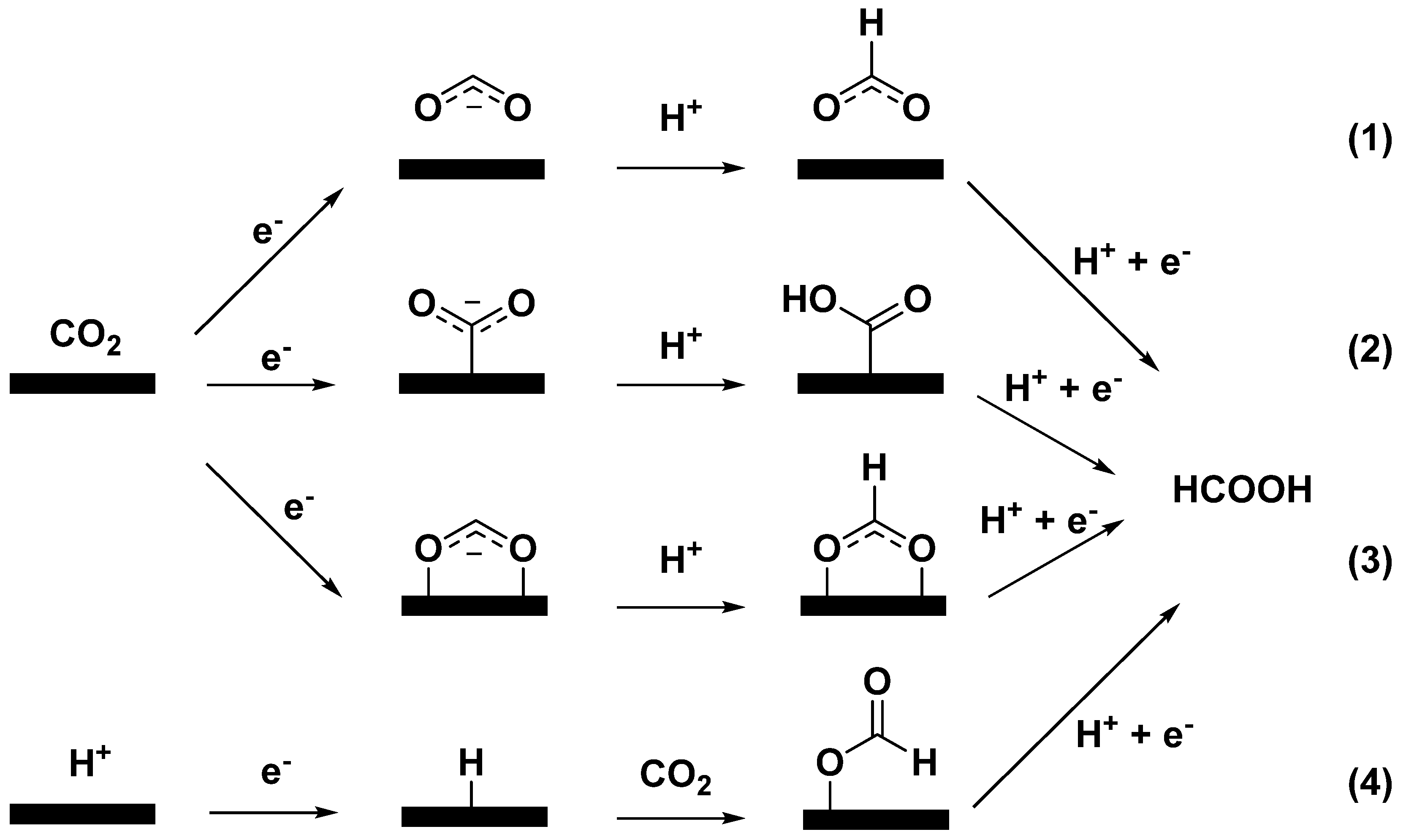
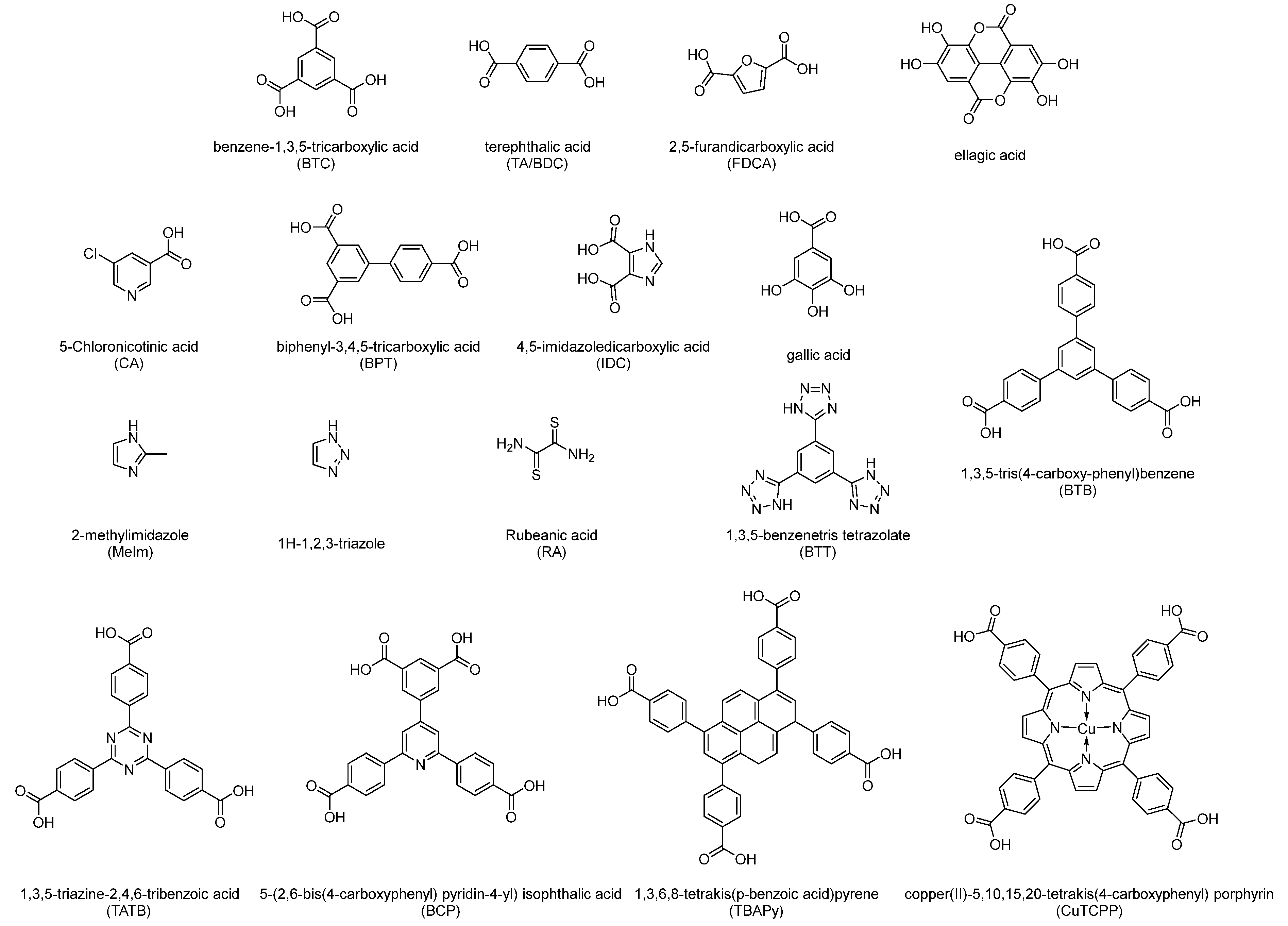
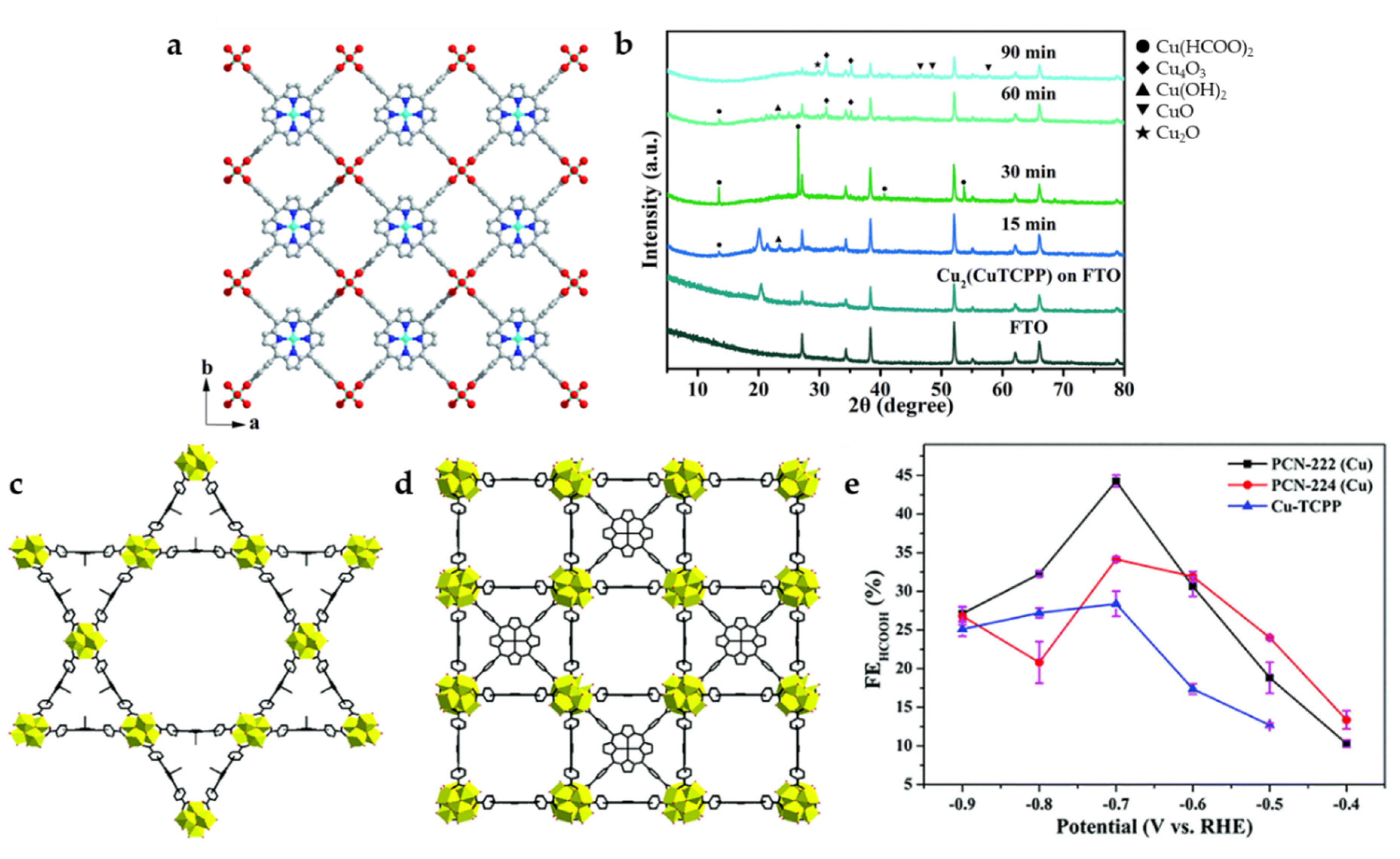
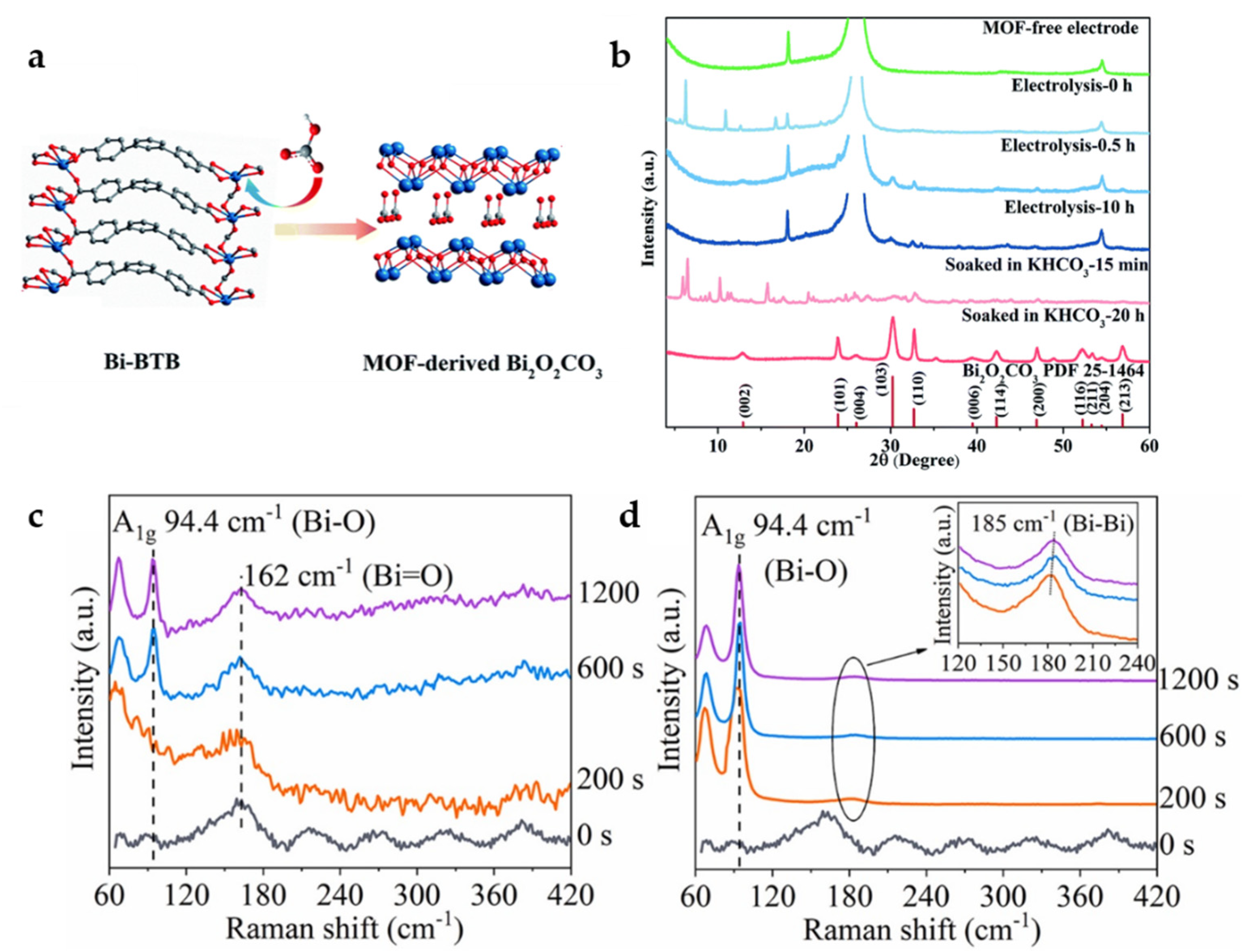
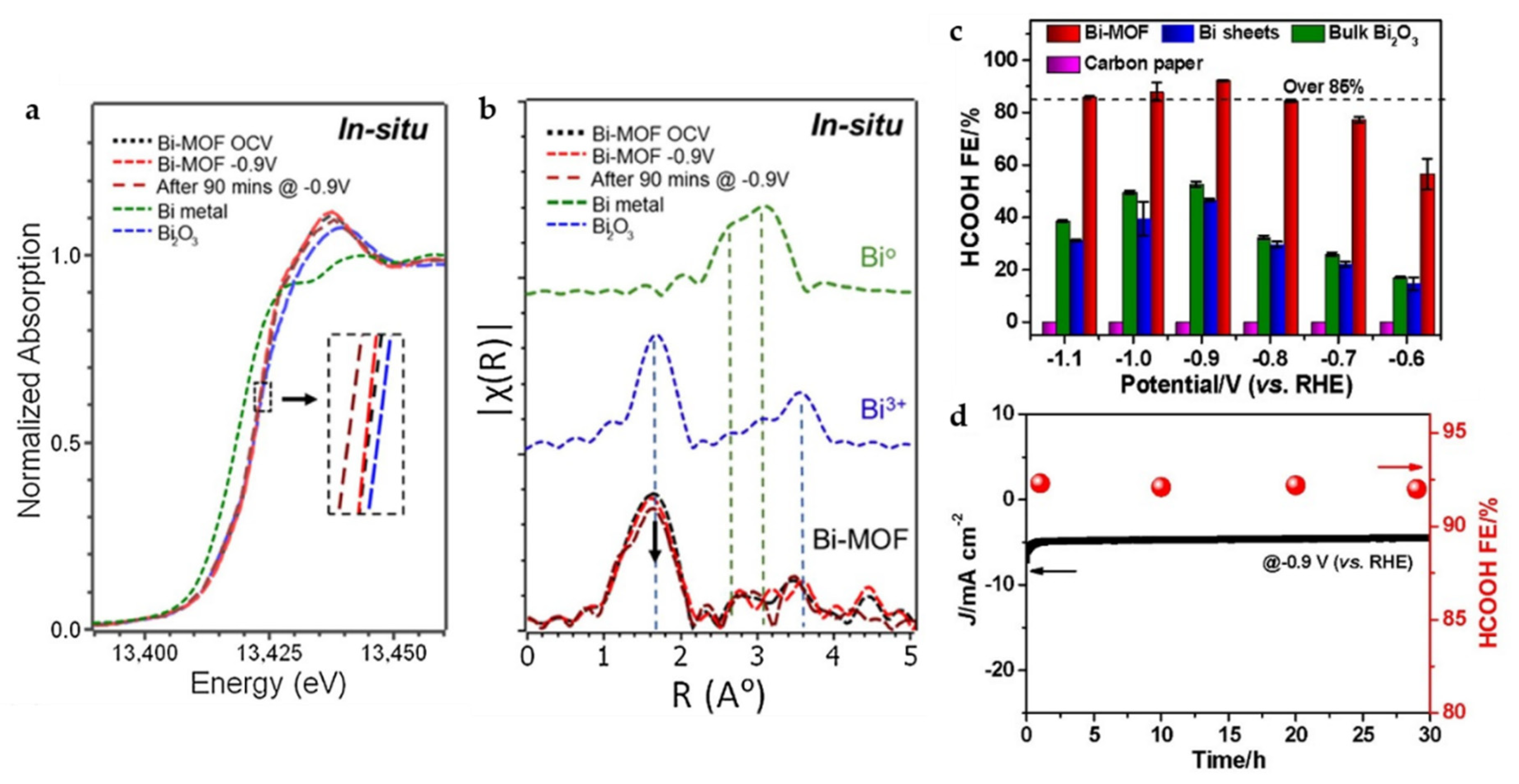
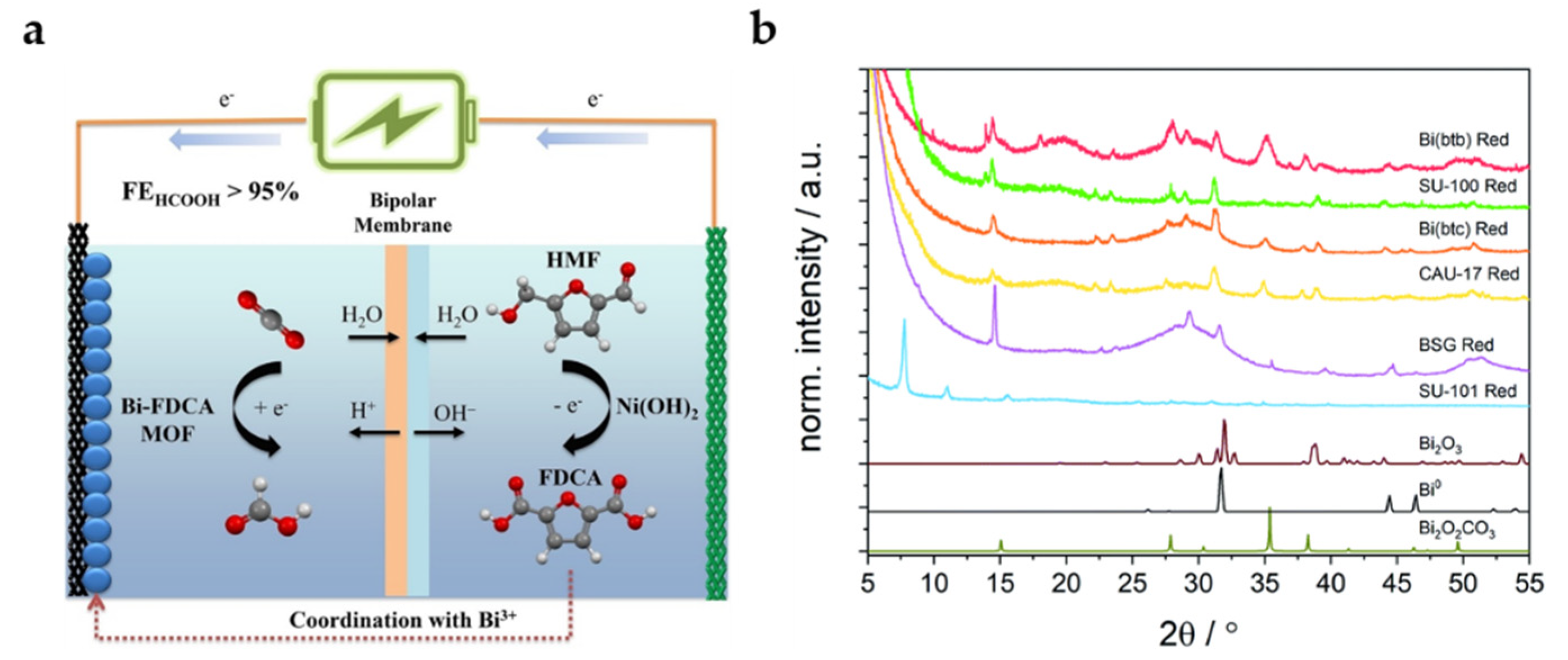
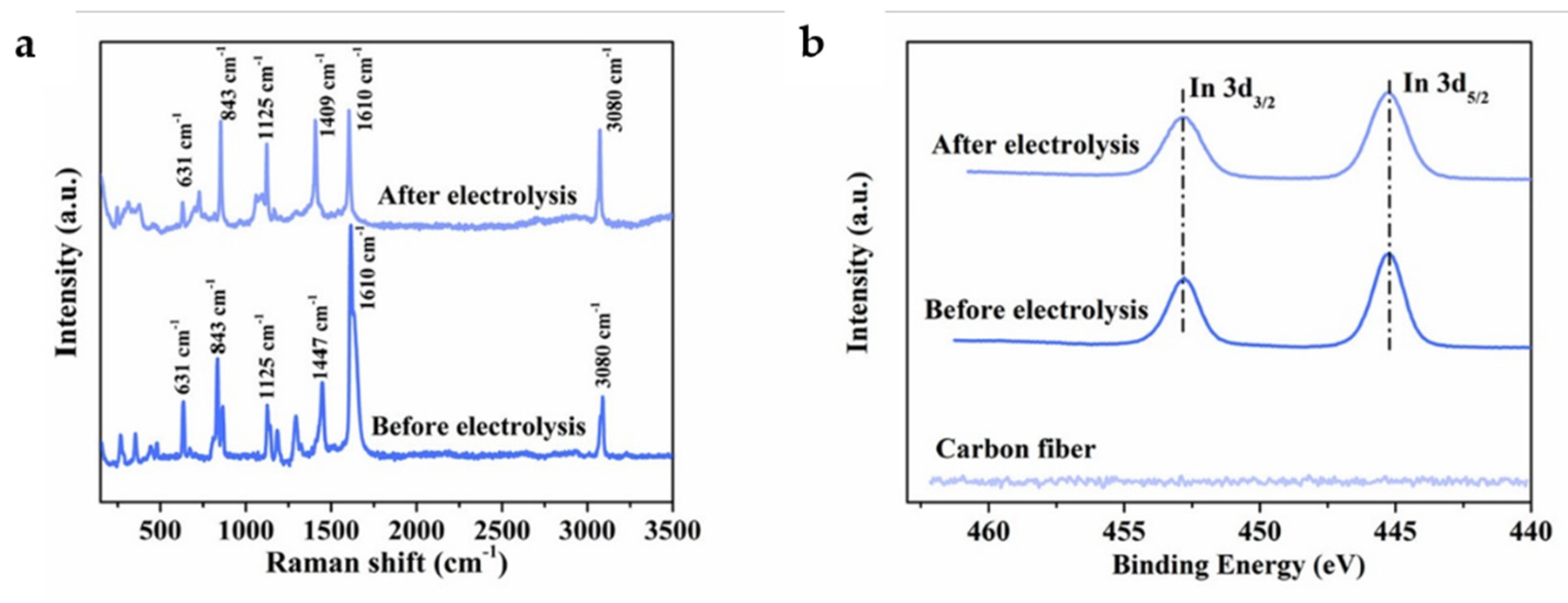
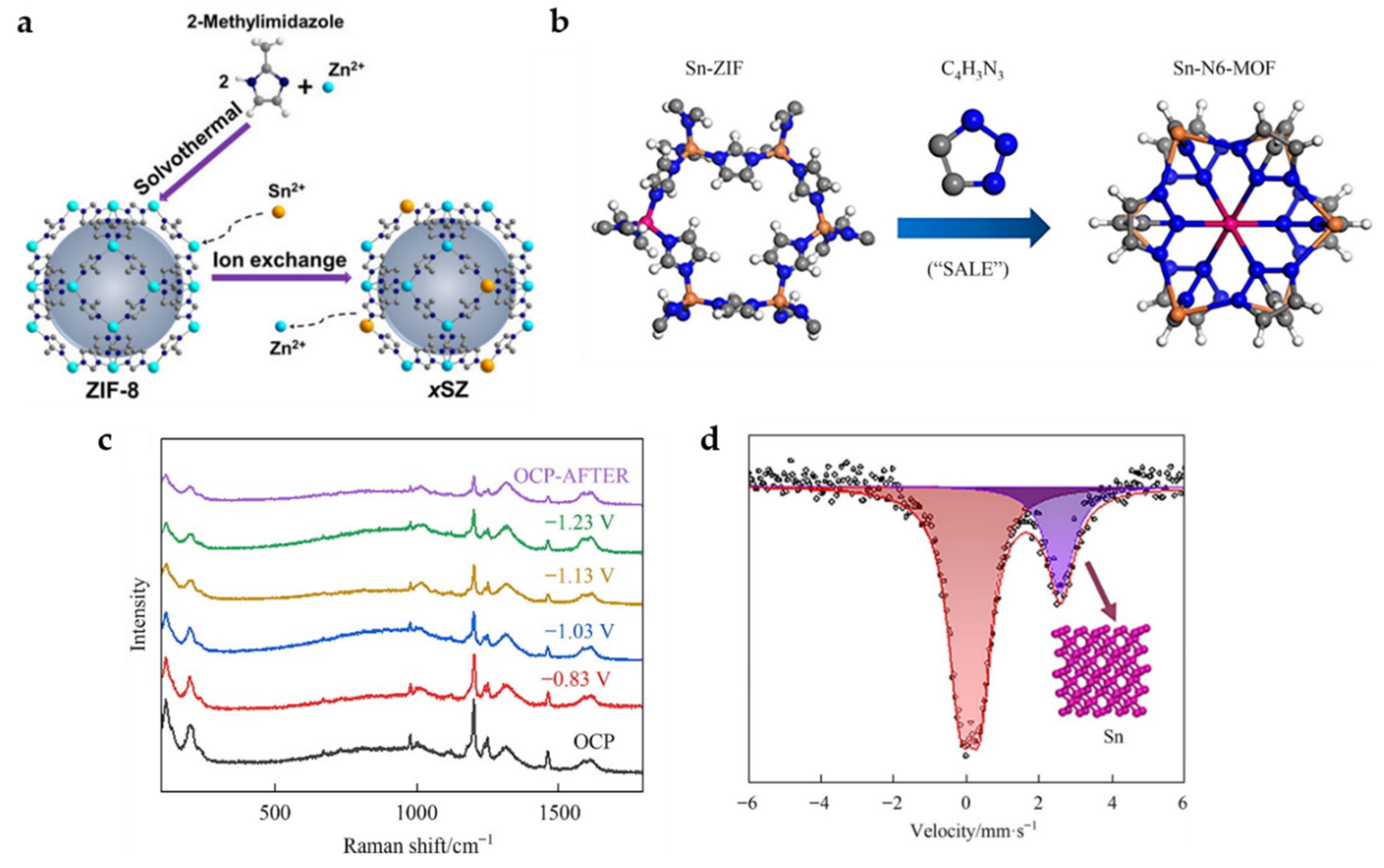
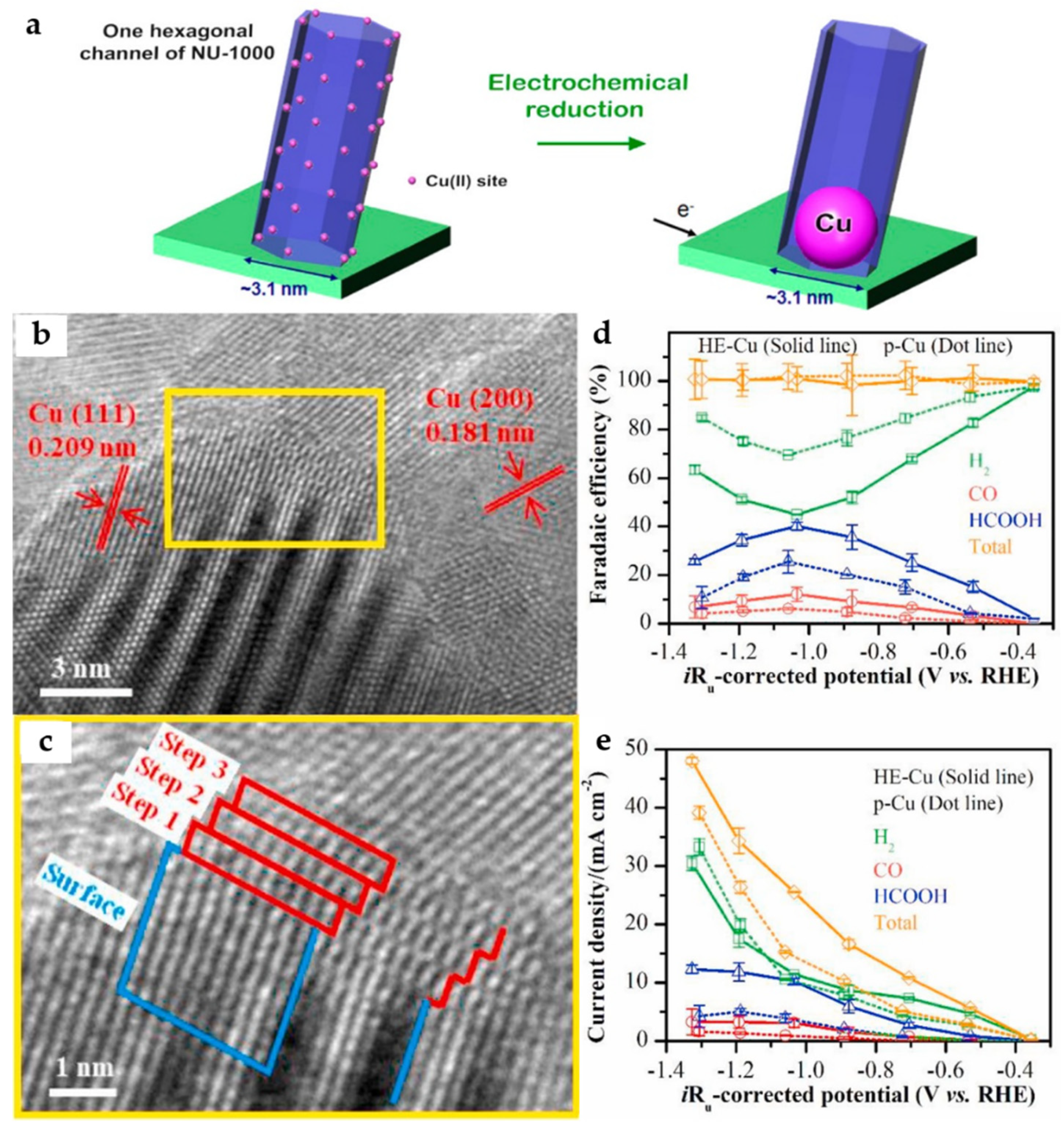
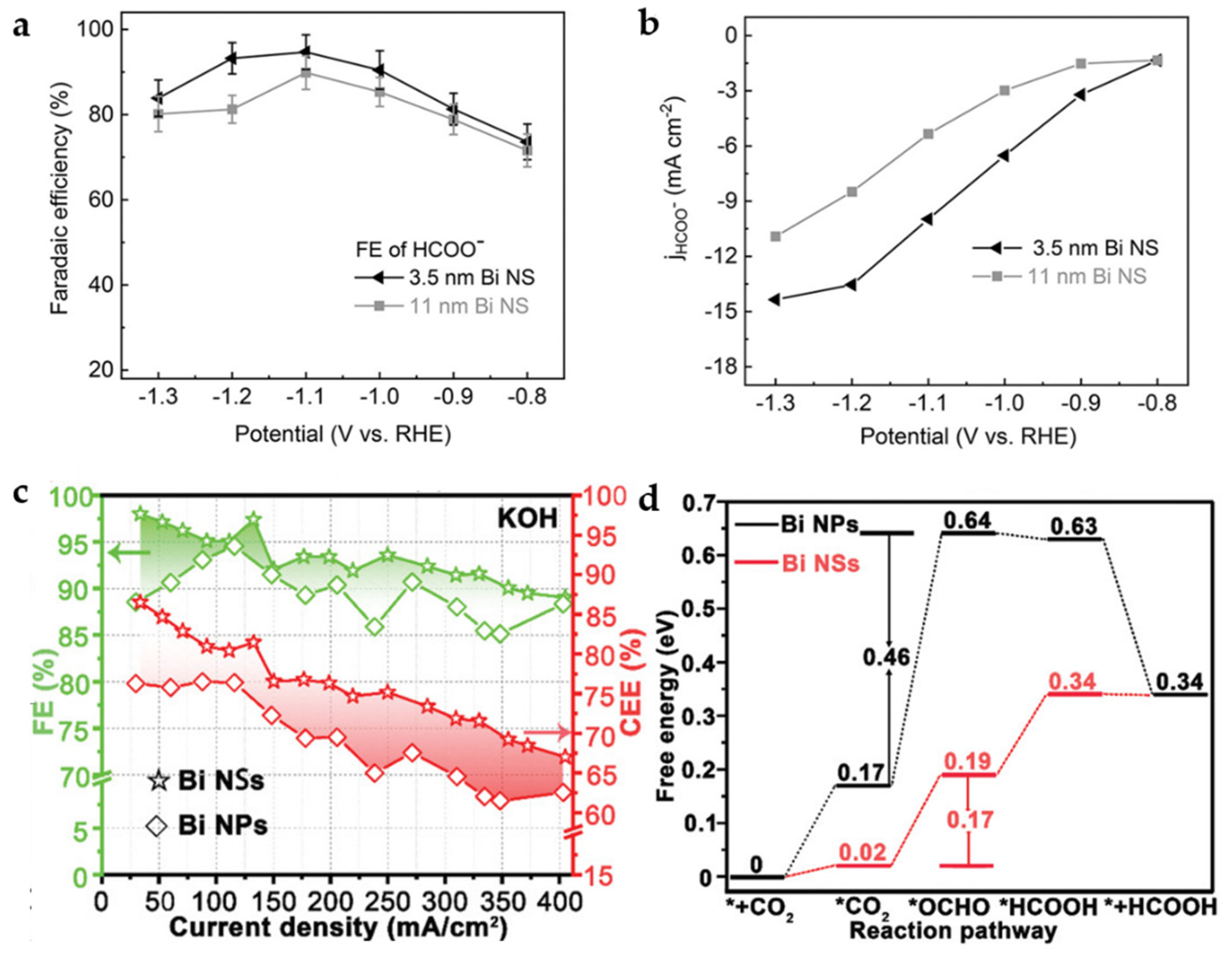
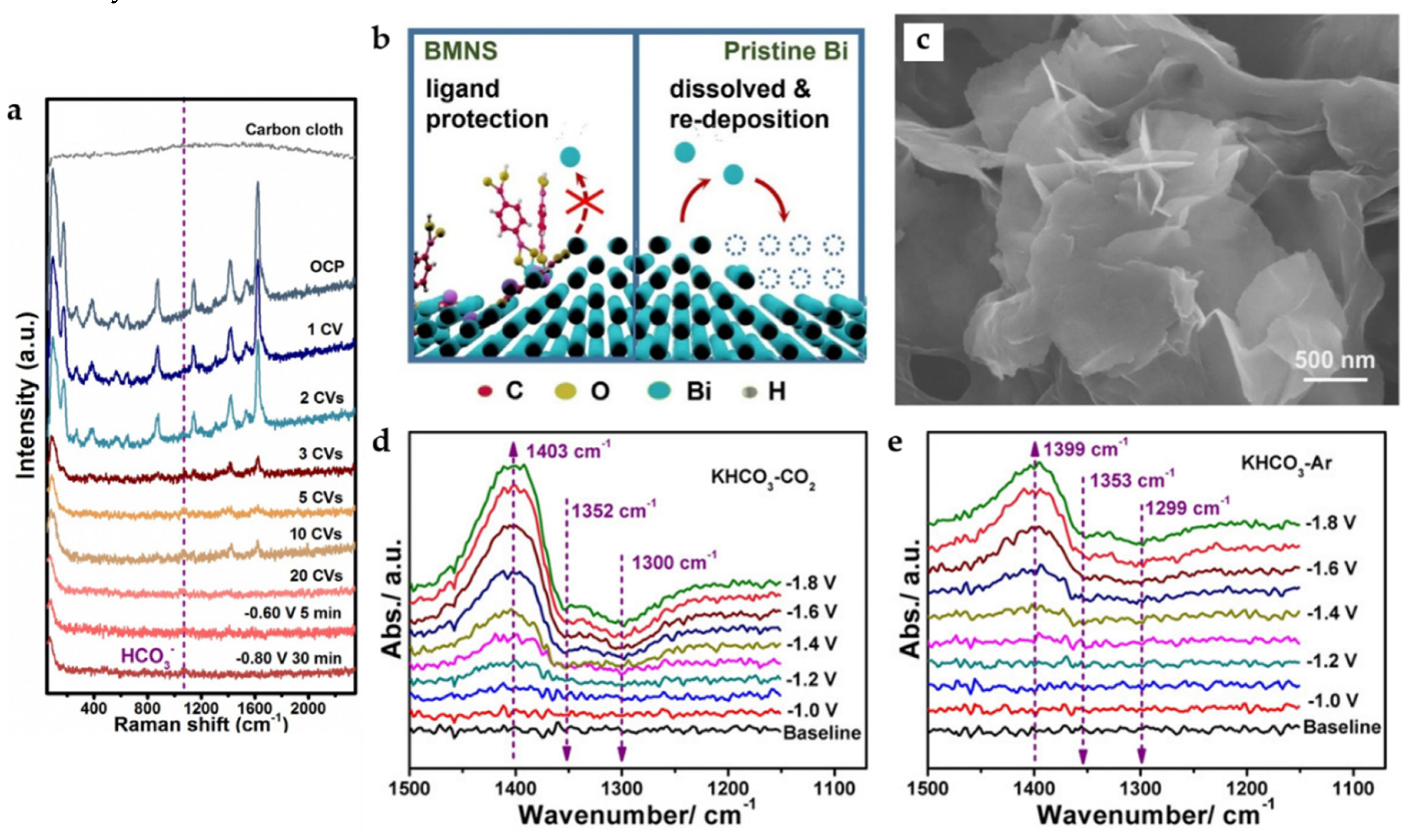

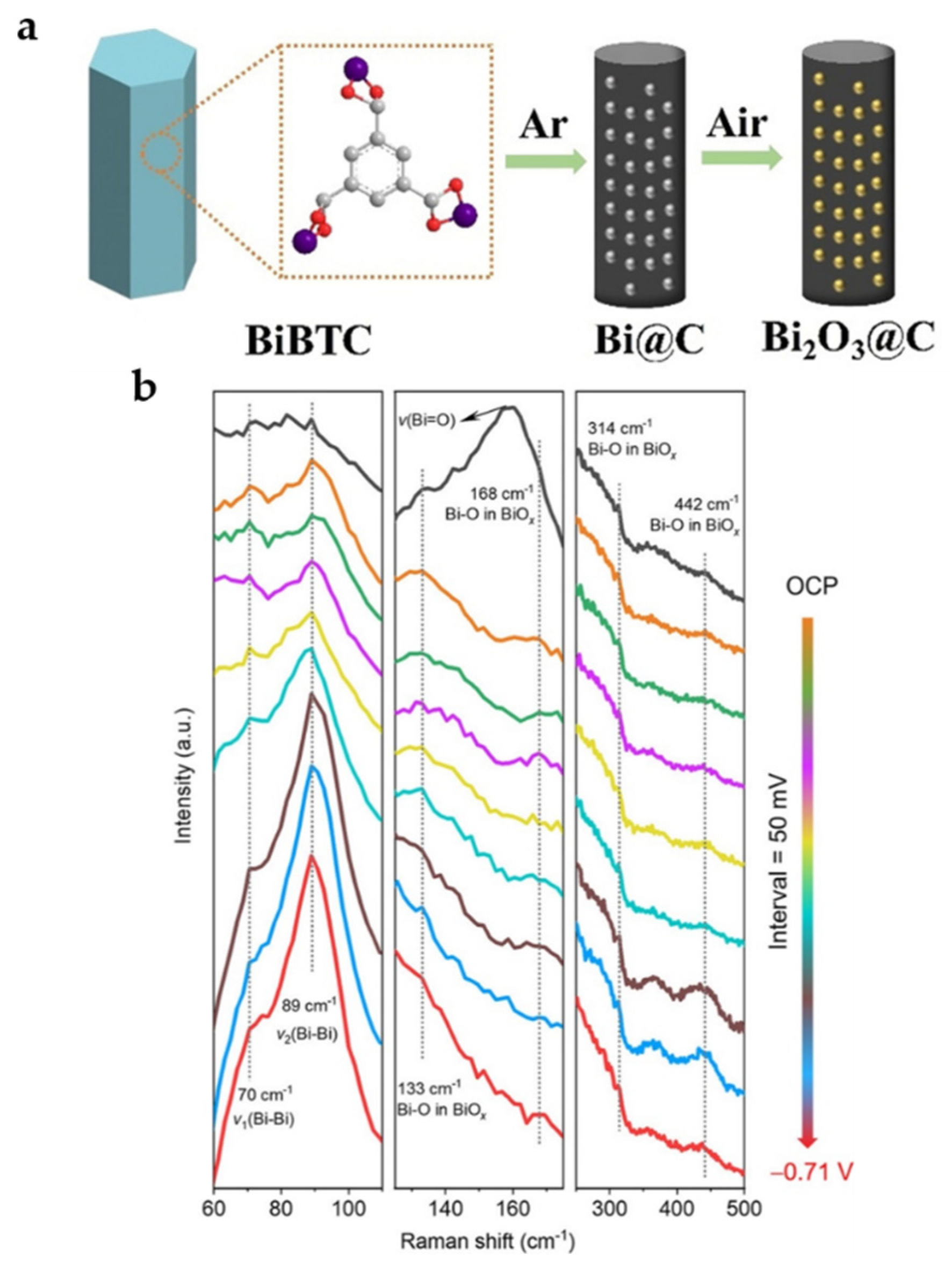
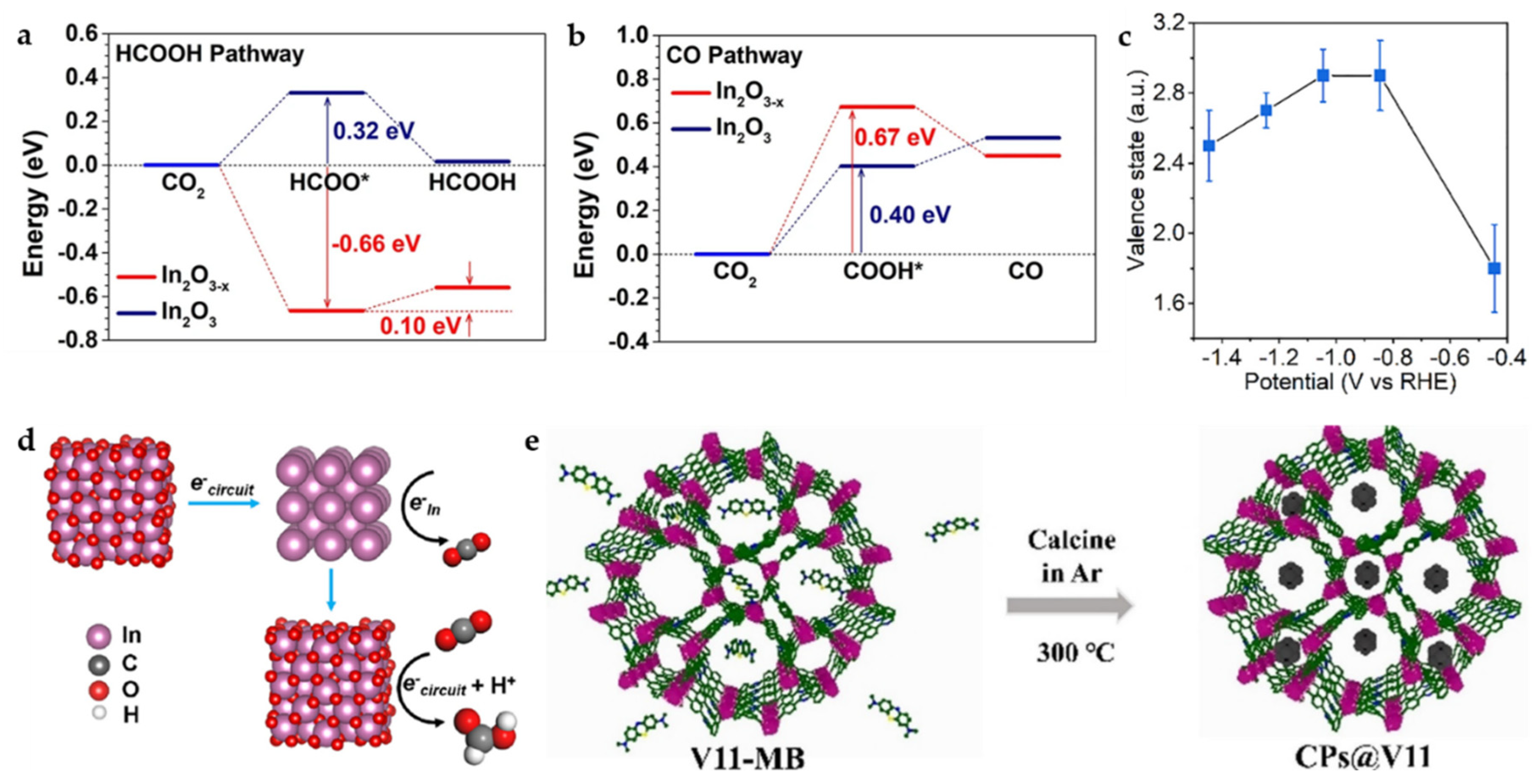

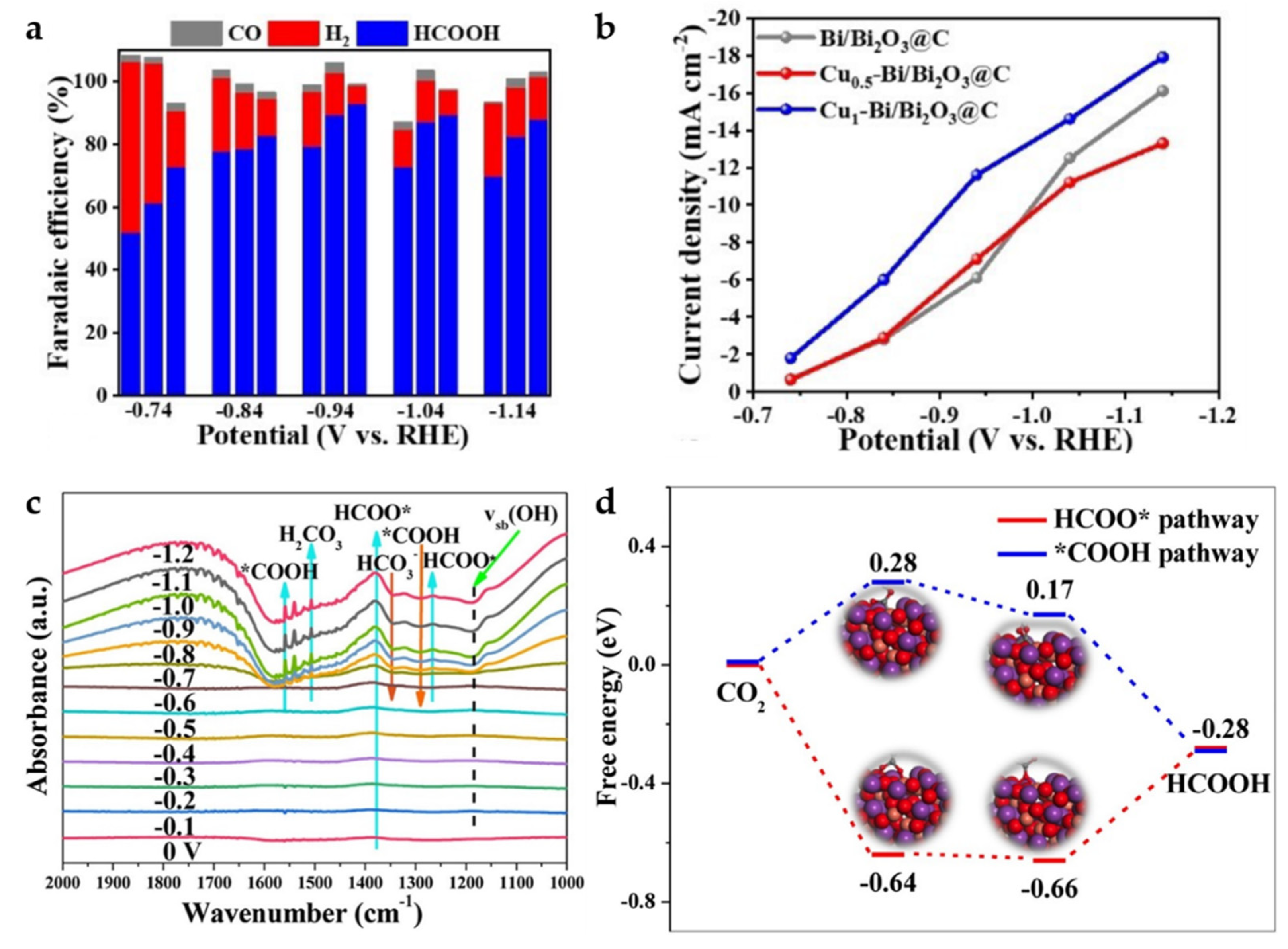
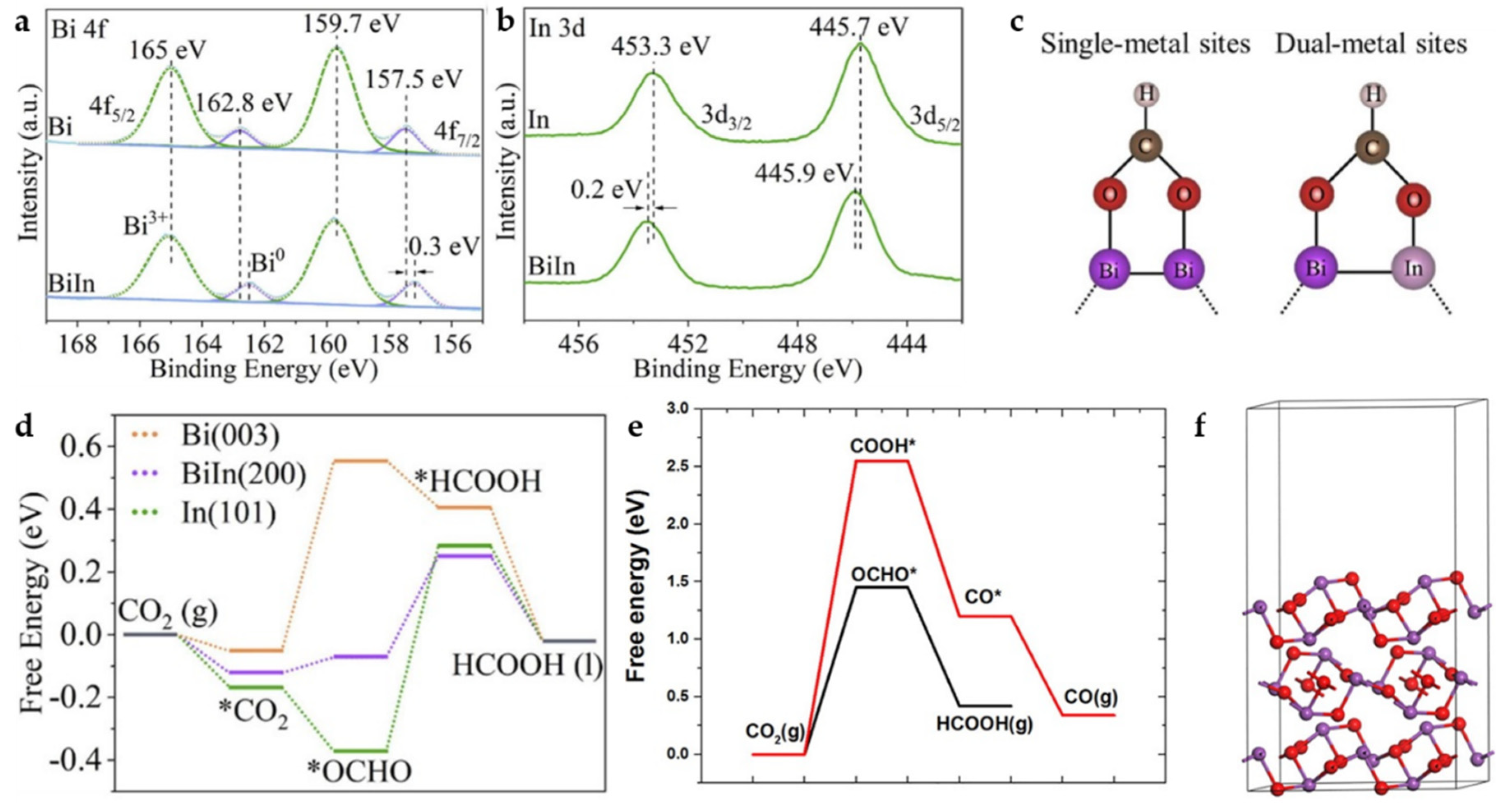

Disclaimer/Publisher’s Note: The statements, opinions and data contained in all publications are solely those of the individual author(s) and contributor(s) and not of MDPI and/or the editor(s). MDPI and/or the editor(s) disclaim responsibility for any injury to people or property resulting from any ideas, methods, instructions or products referred to in the content. |
© 2023 by the authors. Licensee MDPI, Basel, Switzerland. This article is an open access article distributed under the terms and conditions of the Creative Commons Attribution (CC BY) license (http://creativecommons.org/licenses/by/4.0/).





